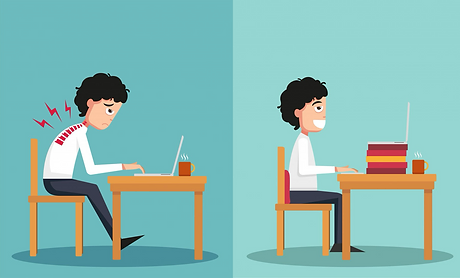Have you ever stopped to think about how your posture might be affecting your mood? It might sound strange, but studies have shown that the way we hold our bodies can have a big impact on our mental health.
In today’s world, stress, anxiety, and low mood are all too common. But what if I told you that something as simple as sitting up straight could help improve your overall well-being?
Think about it: when you’re having a bad day, how do you hold yourself? Chances are, you’re slouching, your shoulders are hunched forward, and your head is down. But when you’re feeling good, you probably sit up taller, your chest open, and your head held high.

Turns out, there’s a scientific reason for this. It’s called memory recall bias, and it basically means that our posture can affect what kind of memories we’re able to access. When we slouch, we’re more likely to recall negative experiences and words, but when we sit up straight, we’re more likely to remember positive things.
But the benefits of good posture go beyond just positive thinking. Sitting, standing, and walking in an upright posture can lead to:
-
Improved psychological state
-
Less sleepiness
-
Increased tolerance to pain
-
Increased feelings of power
-
Increased energy levels
-
Higher self-esteem
-
Reduce fatigue
-
Increased positive mood
-
Increased resilience to stressful situations

But let’s be real – sitting up straight all day is easier said than done. It takes a lot of effort to maintain good posture, and most of us simply don’t have the energy for it.
More than 90% of the brain’s energy is used for posture alone. “The more mechanically distorted a person is, the less energy is available for thinking, metabolism and healing” Dr. Roger Sperry, Nobel Prize winner in Medicine in 1981.
So what can you do to improve your posture? For starters, try to be mindful of the chairs you sit in, beds you sleep in and shoes you walk in.
If you are truly committed to transforming your posture, you owe it to yourself to seek out the expertise of a professional. By tapping into the transformative power of Advanced Biostructural Correction™, you can finally unlock your body’s full potential. By correcting the alignment of your bones and leveraging them back into a mechanically advantageous position, your body can stay upright all on its own, allowing you to enjoy all the benefits of good posture without having to think about it. Imagine feeling confident and strong, effortlessly standing tall, with the right guidance and support, this dream can become a reality.
The mind and body are undeniably linked, and taking care of your posture is just one way to improve your overall well-being.
References:
-
Hackford, J., Mackey, A. and Broadbent, E. (2019) ‘The effects of walking posture on affective and physiological states during stress’, Journal of Behavior Therapy and Experimental Psychiatry, 62, pp. 80–87. Available at: https://doi.org/10.1016/j.jbtep.2018.09.004.
-
Michalak, J., Mischnat, J. and Teismann, T. (2014) ‘Sitting Posture Makes a Difference-Embodiment Effects on Depressive Memory Bias’, Clinical Psychology & Psychotherapy, p. n/a-n/a. Available at: https://doi.org/10.1002/cpp.1890.
-
Nair, S. et al. (2015) ‘Do slumped and upright postures affect stress responses? A randomized trial’, Health psychology : official journal of the Division of Health Psychology, American Psychological Association, 34(6), pp. 632–41. Available at: https://doi.org/10.1037/hea0000146.
-
Peper, E. et al. (2017) ‘How Posture Affects Memory Recall and Mood’, Biofeedback, 45(2), pp. 36–41. Available at: https://doi.org/10.5298/1081-5937-45.2.01
-
Peper, E. and Lin, I-Mei. (2012) ‘Increase or Decrease Depression: How Body Postures Influence Your Energy Level’, Biofeedback, 40(3), pp. 125–130. Available at: https://doi.org/10.5298/1081-5937-40.3.01.
-
Posture and Spinal Hygiene Improves Brain Function | Escarpment Magazine (no date) www.escarpmentmagazine.ca. Available at: https://www.escarpmentmagazine.ca/wellness/posture-and-spinal-hygiene-improves-brain-function/.
-
Wilkes, C. et al. (2017) ‘Upright posture improves affect and fatigue in people with depressive symptoms’, Journal of behavior therapy and experimental psychiatry, 54, pp. 143–149. Available at: https://doi.org/10.1016/j.jbtep.2016.07.015.
-
Wilson, V.E. and Peper, E. (2004) ‘The Effects of Upright and Slumped Postures on the Recall of Positive and Negative Thoughts’, Applied Psychophysiology and Biofeedback, 29(3), pp. 189–195. Available at: https://doi.org/10.1023/b:apbi.0000039057.32963.34.